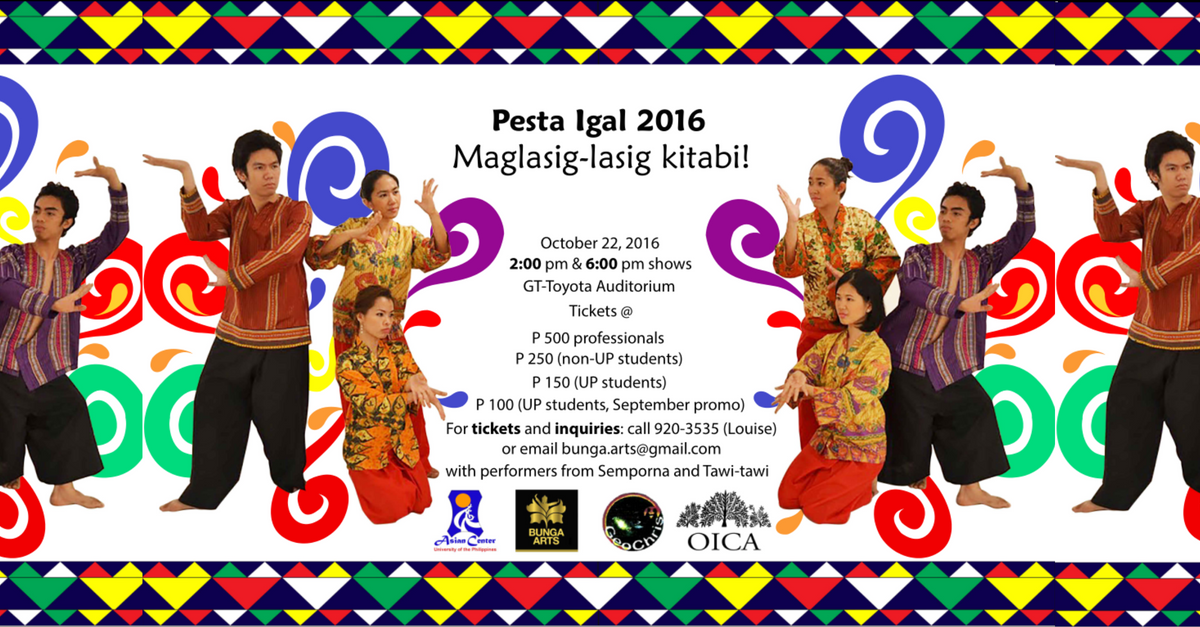 The Pesta Igal concert series returns to the GT-Toyota Asian Center Auditorium, Asian Center, University of the Philippines Diliman on 22 October 2016, with performances at 2:00 p.m. and at 6 p.m. This year’s theme is Maglasig-lasig kitabi! (Let us all celebrate together!).
The Pesta Igal concert series returns to the GT-Toyota Asian Center Auditorium, Asian Center, University of the Philippines Diliman on 22 October 2016, with performances at 2:00 p.m. and at 6 p.m. This year’s theme is Maglasig-lasig kitabi! (Let us all celebrate together!).
The festival-concert enjoins audiences to partake of the rich performance traditions of the Sama-Bajau people of the Southern Philippines. It features igal and pansak dance pieces and kulintangan ensemble music pieces from four Sama-Bajau performing groups from Semporna, Malaysia; Bongao, Tawi-Tawi; Apalit, Pampanga; and San Andres, Manila.
| TICKET PRICES | ||
| UP Students (PhP 150)* | Non-UP Students (PhP 250) | Professionals (PhP 500) |
TICKETS
To inquire and/or buy tickets, please contact Ms. Luna Fojas (0917-853-4009) or drop by Room 105, Hall of Wisdom, GT-Toyota Asian Cultural Center, UP Asian Center. Please look for Ms. Louise Sanchez between 8 a.m. and 5 p.m. She can be contacted at 920-3535. View vicinity map for directions. Tickets can be bought at the UP Asian Center, Mondays to Fridays, 8 a.m to 5 p.m.
ABOUT THE FESTIVAL-CONCERT
Igal and pansak are two dance labels used by Sama-Bajau groups to refer to their traditional dances. These dance forms are characterized by fluid and graceful arm movements that evoke the swaying of palm fronds, the drifting of see grasses, and the curling of the waters of the ebbing and flowing tides reflecting the marine environment of its birth place. The kulintangan ensemble (aka tagunggo’an ensemble) is composed of a kulintangan instrument, which is basically a set of graduated knobbed gongs; a tambul, which is an indigenized version ofthe Spanish martial drum; and one, two or three hanging gongs. The interlocking rhythmic patterns of kulintangan ensemble music have been noted as one of the most complex and sophisticated expressions in maritime Southeast Asia.
Dean Macrina H. Morados of the UP Institute of Islamic Studies says that “the Pesta Igal series has provided an avenue for the development and transformation of positive discourses relating to bangsamoro culture in the country. I realize that presenting our cultural traditions can be an effective way to promote understanding among peoples of different cultures. As a space of convivial celebration, it undoubtedly contributes to achieving peaceful co-existence...” (Humanities Diliman 12 (2): 180–90, July-December 2015).
ABOUT THE ORGANIZERS
Spearheading the cultural event is the Bunga Arts Link (BAL) under the artistic direction of Dr. MCM Santamaria of the Asian Center, University of the Philippines Diliman. BAL is a group composed mostly of non Sama-Bajau researchers, writers, dancers and musicians engaged in the study of the igal dance tradition and in the production of contemporary choreographic creations. Funds raised from the concert will be used to buy kulintangan instruments for Sama-Bajau communities in Metro Manila and nearby provinces. The BAL has so far donated musical instruments to Sama-Bajau communities in Apalit, Pampanga; Cabanatuan City, Nueva Ecija; Dauis, Bohol, and San Andres, The event is produced by the Bunga Arts Link, the University of the Philippines Asian Center, and Geochris Foundation Inc; and sponsored by UP OICA (Office for Initiatives for Culture and the Arts); Toyota Motors; Office of the President, University of the Philippines; and Office of the Chancellor, University of the Philippines Diliman.
TICKETS and SPONSORSHIPS
For sponsorship and tickets, please contact Ms. Luna Fojas (0917-853-4009) or kindly drop by Room 105, Hall of Wisdom, GT-Toyota Asian Cultural Center, UP Asian Center. Please look for Ms. Louise Sanchez (920.3535). View vicinity map for directions. Schedule of Performances on 22 October 2016: Matinee (2:00 p.m.) Evening Performance (6:00 p.m.)
The UP Asian Center offers M.A. programs in Asian Studies with four fields of specialization: Northeast Asia, Southeast Asia, South Asia, and West Asia. The Center also has an M.A. program in Philippine Studies that allows students to major in Philippine society and culture, Philippine foreign relations, or Philippine development studies. The Center offers a Ph.D. program in Philippine Studies in conjunction with the College of Arts and Letters and the College of Social Sciences and Philosophy. Get an overview of these programs. The Asian Center also houses a peer-reviewed, open-access journal, Asian Studies: Journal of Critical Perspectives on Asia. It has published several books and monographs, and hosts or organizes various lectures and conferences.

